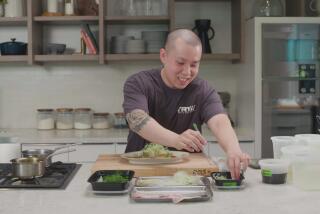Slain Businessman Left Debts, Ailing Firm in Japan : Crime: Investigators say Yasuo Kato may have been killed by Japanese gangsters in connection with his business dealings.
- Share via
CAMARILLO — A Japanese businessman found stabbed to death in his Camarillo home left heavy debts and a foundering machine-tool company in Japan when he moved here in 1988, according to Japan’s largest daily newspaper.
The information about Yasuo Kato’s legacy of debt came Friday as Ventura County investigators continued to examine the possibility that Kato was killed by Japanese gangsters in connection with his business dealings.
Kato’s body was found Monday in the garage of his home near a bloodstained, jagged-edged hunting knife. Kato, reportedly a martial arts champion, had died of two swiftly delivered knife wounds to the heart.
Authorities said Kato, an investment counselor and real estate developer, was attacked so quickly that he did not even have time to touch the wounds before he collapsed. That led police to believe that Kato’s killer either surprised him or was familiar to him.
Ventura County Sheriff’s Cmdr. Vince France said Friday that detectives will take note of the information about Kato’s debts as they investigate the theory that Kato was killed by the yakuza, as members of Japanese organized crime families are known.
But France said police have not ruled out other possibilities, including a theory that Kato was the victim of an American assailant who blamed Japan for the U.S. recession.
France said Friday that his office may ask Japanese police next week to help in the investigation.
Reporters for the Yomiuri Shimbun, whose 9.9 million readers make it the largest newspaper in the world, have been tracing Kato’s last business dealings before his 1988 departure from Japan, said Shigeo Masui, the paper’s Los Angeles bureau chief.
Kato and his second wife, Motoko Kato, bought a building in 1981 in Atsugi, a suburb of Tokyo, Masui said. In 1983, they made the building the headquarters of Kato’s small, 8-year-old company called Hikari Seiki, which manufactured precision molds and machine prototypes, he added.
Over the next five years, the firm took out and paid off $886,000 in loans, using the factory building as collateral, according to real estate records reviewed by reporters for the Yomiuri Shimbun.
The company’s staff had shrunk from 30 employees at its peak to three in 1987, the reporters learned.
By 1988, “He seemed to have so many huge debts . . . he sold this property and the building,” Masui said.
Kato earned $1.5 million on the building’s sale and then left the country--leaving the company with numerous other debts, most of which were never repaid, according to company President Akio Goto.
Goto told the Japanese newspaper that Kato left the company in deep financial trouble, embarrassing his employees with numerous creditors seeking repayment of their debts, according to Masui.
This contradicts an account given by Kato’s son, Toshiyuki, who earlier told The Times that the elder Kato gave the company to his employees out of gratitude for their service.
One employee told Japanese reporters that Kato led a flashy private life, driving a Mercedes-Benz that cost him far more than a Japanese car would have. “Kato’s quite unpopular with his employees, leaving so many debts,” Masui said.
More to Read
Sign up for Essential California
The most important California stories and recommendations in your inbox every morning.
You may occasionally receive promotional content from the Los Angeles Times.













